In today’s fast-paced and competitive business landscape, technical skills and business acumen are no longer sufficient for effective leadership. Leaders must navigate complex interpersonal dynamics, inspire teams, and make decisions that resonate beyond spreadsheets and quarterly goals. Enter emotional intelligence (EI) the secret weapon that distinguishes great leaders from good ones.
Emotional intelligence refers to the ability to recognize, understand, and manage one’s own emotions while effectively navigating and influencing the emotions of others. Popularized by the psychologist Daniel Goleman, EI comprises five key components: self-awareness, self-regulation, motivation, empathy, and social skills. These skills are not innate but can be developed, making emotional intelligence an accessible yet transformative leadership tool.
Does emotional intelligence affect leaders’ decision-making?
Decision-making in leadership is often fraught with pressure, ambiguity, and competing priorities. Leaders with high EI excel in this area because they can remain Calm Under Pressure by Self-awareness and self-regulation that help them avoid rash decisions driven by stress or fear. Also, they find it easy to assess & evaluate emotional contexts because, they can gauge the emotions underlying team dynamics, ensuring decisions by considering both facts and feelings. Moreover, they will be able Adapting to change by having greater flexibility to deal with unexpected challenges or rapid variables in the working environment, enabling all leaders to make more flexible and sustainable decisions, for instance, a leader with strong EI might pause during a heated meeting to acknowledge team members’ concerns, defusing tension and fostering a collaborative decision-making process.
How can EI Leaders Enhance Team Dynamics? Actually, leader’s ability to manage emotions profoundly impacts team morale and performance by three important elements.
Firstly, Building Trust, Leaders who exhibit empathy and authenticity cultivate trust, enabling open communication within teams and of course, this will promotes harmony and loyalty.
Secondly, Conflict Resolution, EI empowers leaders to mediate conflicts effectively, addressing the root cause without alienating team members.
Thirdly, Inspiring Motivation, Leaders with high EI recognize individual strengths and challenges, tailoring their approach to inspire and energize the team, for example, a team struggling with burnout might benefit from a leader who acknowledges their efforts, adjusts expectations, and implements supportive measures like flexible work arrangements.
As a consequences, this will lead us to what we call, The Ripple Effect, since the influence of emotional intelligence doesn’t stop at the individual or team level.
All the above assure to us that, Emotional intelligence is no longer a soft skill — it’s a critical competency for effective leadership in the modern business world.



